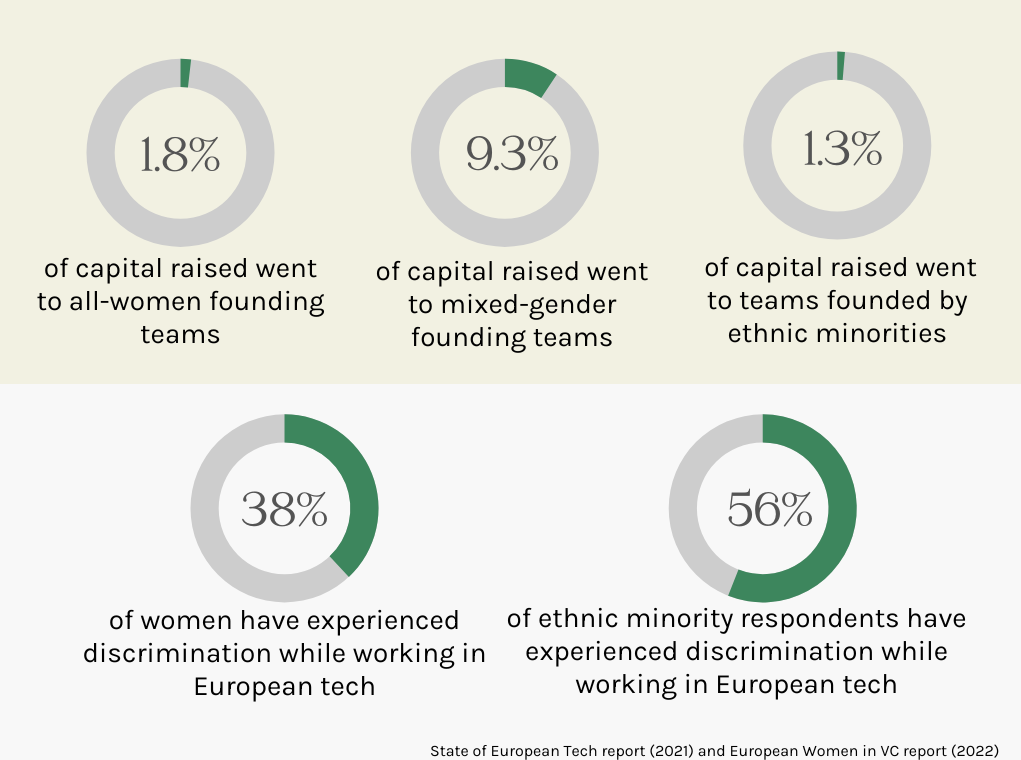While diversity, equity, and inclusion (DEI) continue to be among the hottest topics in the tech and Venture Capital (VC) industry, actual progress still stalls almost across all layers of the ecosystem. Covid-19 had some influence on the slow progress, but overall the action has simply not led to a fundamental impact. According to the State of European Tech report (2021) and European Women in VC report (2022):
- 75% of startups are founded by all-male teams, compared to the 8% founded by all-women teams
- Only 1.8% of capital raised by tech companies went to all-women founding teams and 9.3% to mixed-gender founding teams
- Only 1.3% of tech funding went to teams founded by ethnic minorities
- 38% of women and 56% of ethnic minority respondents have experienced discrimination in the past 12 months while working in European tech
- Women make up just 15% of venture capital general partners in the EU and only manage 5% of the money

That’s why Inklusiiv wanted to create an avenue for VC investors and tech ecosystem experts to further explore the severity of these issues and find pragmatic solutions. So as Europe’ leading startup and tech event, Slush, rolled around, Inklusiiv hosted an official partner event in partnership with Venture ESG, Nasdaq Entrepreneurial Center, NGP Capital, TEK, and TietoEvry.
Intersectionality is (still) overlooked
What’s still wrong with DEI in tech? So far, we have almost no data regarding the intersection of different kinds of diversity, e.g. on black women VCs or gay founders from Latin America. As a result, how the different variables of diversity work together is understood very poorly in tech. Despite the obvious: the more marginalized groups you belong to, the more likely you are to face discrimination. By extending investment and hiring decisions to be more intersectionality-focused, we can better understand a larger variety of product-market fits, consumers’ needs and desires, and approach problems from a new angle.
“Being underrepresented means you’re underestimated. But it’s also an opportunity because you’re more resilient.” – Christian Tooley, i3 investing
Nobody gets equity
Most initiatives – and most conversations – still focus on the D of DEI: diversity. Call to action usually stops with ‘we need more female VCs’ or ‘we need more black founders getting VC money’. What we don’t get at is who actually has equitable decision-making power, who gets equitable benefits from payouts, and whether underrepresented groups are given the resources to level out the playing field. The next time you encounter a partner or founder from an underrepresented background, ask yourself, is this individual benefiting from the carried interest in the same way their peers are?
Flaws are systematic
Diversity, equity, and inclusion in tech and VC will not solve themselves with time. Time and time again, research supports that the problem is embedded deeply into our society and the structures of the business world. For example, VC firms continue to rely on internal networks for recruitment, leading to homogeneous outcomes. These overlooked biases and narrow recruitment methods enable the problem to persist. Hence, we need to proactively move from soft actions within the existing system to real systemic change and hold decision-makers accountable.
“Will time fix this? No, it won’t. It’s so hard to recognize privileges. So many think VC is about meritocracy although research shows it is not. – Susanna Bairoh, TEK”
3 ways to enable change that sticks
Before action, you need awareness to build the grounds for change. But the actual change comes from the actions that follow. The more intentional, holistic, and tangible the action is, the better the results will be.
DEI awareness is lacking
As most people still focus exclusively on diversity, ignoring inclusion and equity, it is evident that awareness surrounding DEI topics is still falling short. The education phase is often overlooked even though it lays the groundwork for sustainable change. Based on a study by Inklusiiv x VALIDEI (2022), it seems that the companies that understood equity were exclusively firms that offered DEI training on a strategic or recurring basis. Ultimately, DEI trainings and educational sessions function as catalysts to further understand crucial topics such as intersectionality, allyship, and why DEI challenges are systemic.
What you don’t measure, doesn’t matter nor change
Surely you’ve heard the saying, ‘what you don’t measure, you can’t change.’ The same principle couldn’t be more true with DEI work. Thus, it’s imperative that both VCs and tech companies focus more on measurable initiatives, which allows them to uncover which practices are truly effective. For a VC this can for instance mean auditing the deal flow process and uncovering the shortcomings and blind spots. Where are the underrepresented groups dropping off? Or do they even get in touch with us?
By measuring diversity and inclusion in your organization you can also learn much more about your strengths and what ought to be your improvement priorities. According to Inklusiiv x VALIDEI (2022), 78% of VCs measuring diversity in at least 3 points in their deal flow reported significant increases to diversity in their portfolio teams. However, keep in mind that there are various limitations to measuring DEI, due to data privacy and anonymity issues. To collect the most relevant and honest data, consider using a neutral third-party survey provider that understands the specific legal requirements related to D&I surveys.
Focus and share your DEI policies and processes
There are plenty of concrete ways a VC fund or a tech company can improve their policies and processes to create a more inclusive and equitable workplace. VCs can make an impact through various means e.g. by building more inclusive recruiting processes and culture, proactively sourcing diverse deal flow, and supporting their portfolio companies with DEI topics. Whereas tech companies can advance DEI by integrating DEI deep into the organization’s strategy and processes. To build sustainable DEI change, firms need to understand that DEI is not an initiative but it is all-encompassing work that needs to be intentional and consistently measured.
“Talent is distributed equally. Opportunities are not.” -Hanna Vuorikoski, TietoEvry
Without setting targets and goals, it is hard to stay accountable. However, don’t try to tackle everything at once if you have limited resources. Instead focus on the most important priorities, to stay motivated and on track for sustainable change.
Last but not least, if you’re developing DEI policies, consider sharing it externally . What we learned from the Inklusiiv x Validei VC study (2022) was that investors who saw business impact from their DEI reporting, were those who consistently shared their company’s outcomes and positions on DEI. You can learn more from VC firms like Atomico, Creandum, Ada Ventures, and Unconventional Ventures, or tech firms like Nokia, and Spotify, all which have transparently communicated about their DEI policies and practices.
Keeping up the momentum with DEI
It is clear that more needs to be done to change the status quo. DEI is a continuous journey that requires constructive conversations, collaborative spirit, and commitment to implement measurable, intentional, and intersectional DEI strategies.
Authors:
Nea Höynälä, Inklusiiv
Johannes Lenhard, Venture ESG

